ICYMI: Tom Cruise - Total Films Icon Of Our Lifetime
World’s Biggest Movie Star, award-winning character actor, chatterbox…
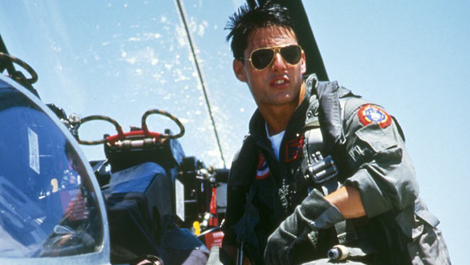
We made Tom the Film Icon of our lifetime 18 issues ago for our 200th birthday. Here, for your pleasure, is that extensive interview, fresh from the TF archives…
When Total Film launched in February 1997, Tom Cruise had Jerry Maguire coming out in UK cinemas the following month, and was up for Best Actor at the 69th Academy Awards, to be held on March 24.
But... no cover of Total Film, the irresistible warmth and intelligence of Jerry Maguire failing to synthesize with the magazine’s launch manifesto of guns, babes and cool.
In our sophomore year, the stars adorning the cover included Uma Thurman, Drew Barrymore, Ben Affleck, Cameron Diaz and Jennifer Lopez (the less said about Posh Spice and Maria Pitillo the better). No Cruise. Why? There was no Cruise movie to promote.
What the hell was going on? Then, as now, he was the biggest star on the planet – and had been since 1986’s Top Gun strafed his career skywards – so why no film releases between March ‘97 and September ‘99?
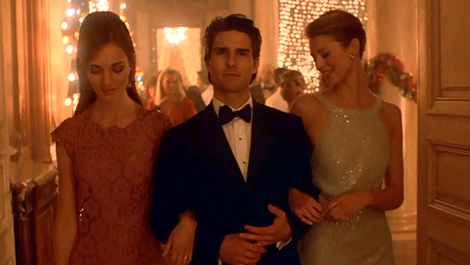
Three words: Eyes Wide Shut . Or rather two words: Stanley Kubrick. Kubrick’s record-breaking shoot took Tom (and then-wife Nicole Kidman) out the game for 400 days, holing him up at Pinewood Studios for looong, dark nights of the soul.
Only now is Kubrick’s discombobulating swansong finally attracting the appreciation it deserves, and the same goes for Cruise’s passive, uptight, consciously mannered performance as Dr. Bill – a voyeur who ricochets through New York on a sexual odyssey.
Bringing all the latest movie news, features, and reviews to your inbox
In March 2000 came the explosion of Magnolia , with Cruise’s oil-slicked, rapacious sex guru Frank T.J. Mackey dominating a devastating ensemble in a devastating film.
Somehow he lost the Best Supporting Actor Oscar to a strangely accented Michael Caine in the polished-but-dull The Cider House Rules ; he lost the TF cover, meanwhile, to David O. Russell’s Three Kings .
Incredibly, Cruise’s first Total Film cover didn’t arrive until Issue 42 in July 2000, for Mission: Impossible II . By the time Mission: Impossible – Ghost Protocol came out in 2011, however, he’d occupied no fewer than 10 covers, and the fourth Mission’s haul of $694,713,380 at the worldwide box office (Cruise’s biggest ever hit) amply reinforced his status as the world’s number one movie star.
“I feel lucky being able to do what I do,” Cruise tells Total Film, explaining how he maintains his drive after three decades at the top.
“I remember being four years old, dreaming about movies and thinking ‘One day I’d love to make a movie’. Then it happened. I was on the set of Taps ."
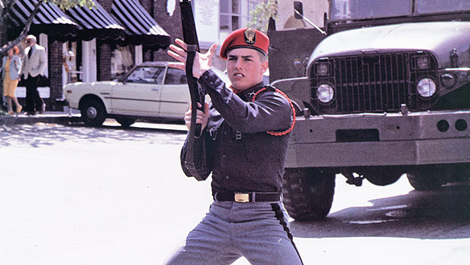
"In those days there weren’t schools necessarily, you couldn’t go on the internet and find out about angles and shots... I was working with Owen Roizman [cinematographer], Harold Becker [director] and Stanley Jaffe [producer], who had just won the Oscar for Kramer Vs Kramer . I remember thinking, ‘If I don’t get to make another movie, I just want to learn as much as I can...’ On every film, I learn something. It’s an excitement for what I do, a challenge to constantly push myself.”
Cruise has just finished shooting his first day on sci-fi war movie Edge Of Tomorrow . Directed by Doug Liman, it’s a two-hander (with Emily Blunt) about a soldier battling a seemingly indestructible alien foe. The catch? He’s caught in a time loop, fighting the same day over and over and over. It’s Groundhog Day meets Starship Troopers , but with the grit of Black Hawk Down .
“Today was awesome! Oh god, it was fun, so much fun,” Cruise laughs, boomingly. “You know what? The night before I start shooting, I can’t sleep; I’m so excited. Yeah, man!”
So, Tom Cruise, Icon of Total Film’s Lifetime (“Wow, I’m honoured, thank you. That’s so cool”)... what is the secret to selecting all those iconic roles? Is there a system to shuffling the curveball likes of Magnolia , Collateral and Tropic Thunder with the Mission movies, Minority Report and War Of The Worlds ?
“I touch one genre and then I feel like I want to do something else,” he shrugs. “I’ve always tried to push myself and have a diverse taste. I’m someone who wants to entertain people, and you have different types of audiences for different kinds of films.”
It’s something Cruise has done from the get-go, his CV littered with challenging, contentious choices that many A-listers would shirk. Cruise laughs, heartily, and readily admits that there have been times, and many of them, when his advisors have asked him to wind his neck in.
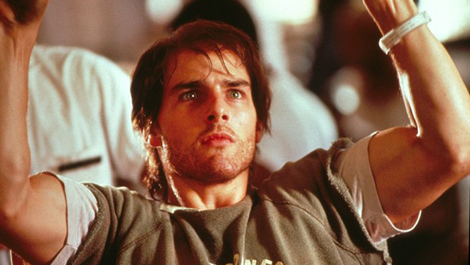
“Yeah, there have been moments!” he says. “I remember when I did Born On The Fourth Of July , there were people who said it was going to ruin my career. But I’ve always felt that it’s my choice, and here are the things that I’m interested in, the stories and the people that I want to do... I listen to, and appreciate, the advice, but when you read the script and meet with a filmmaker, there’s a gut thing where you go, ‘I want to go on this journey.’ It’s a very personal journey, making a movie. You just have to go for it, if it’s something you believe in.”
In the groove, Cruise continues. “I remember doing Rain Man and there were articles criticising we were even making that movie: ‘What is it, just two schmucks in a car?’ I remember saying to Dustin, ‘Man, this is intense.’ Paul Newman [who Cruise paired with in 1986’s The Hustler sequel, The Color Of Money ] always said, ‘You gotta ignore the white noise. Just live your life, make your choices.’ As time has gone on, I’ve realised just how true that is. If it works, it works, and if it doesn’t work, you still have to know why you did it. I’ve never walked through anything in my life.”
Ah, the noise. It’s always been there, hounding Cruise back when he was making Cocktail , the New York Times claiming this harmless, escapist, romantic drama was glamourising alcohol abuse.
But these days the noise has amplified exponentially. Cruise, more than most, has been subjected and tormented, the ether polluted with tawdry speculation on his marital break-ups and beliefs. The only way to survive it is to take a deep breath and become the eye of the cyclone.
“It is what it is,” he states. “You have to ignore it, keep focused and move on. It doesn’t reflect in the work... When you look at the history of movies, and the history of the noise... Vertigo really wasn’t that well received, and now you look at it and go, ‘Jeez, look at this movie.’
"That’s why I say about working hard. Keep telling stories. When I look at David Lean, who made Ryan’s Daughter then didn’t make another movie for 10 years.... There’s always a chance of failure, and you can’t worry about failure, you have to think of the story. Do not be frozen. Even in success.”
Cruise’s drive and focus are the stuff of legend. Just to walk in a room with him and shake his hand (firm grip, big shake) is to feel his positivity; his aura blinds as surely as his teeth.
Talk to anyone who’s ever worked with him, from Nicholson, Hackman and Hoffman down to the technicians and craft services, and they all say the same: he’s the first on set, the last to leave, a whirlwind of energy who’s on hand even when his presence isn’t dictated by the call-sheet.
His love of movies and storytelling is infectious. During the course of Total Film’s 50-minute interview, he discusses Hitchcock, Ford, Wilder (his kids love Some Like It Hot), Leone, Spielberg; Citizen Kane , Shane , Duck Soup (another favourite with the kids), North By Northwest ... Three times Total Film apologises for running over our allotted 25 minutes, and each time he replies, “No, it’s my pleasure. It’s fine, buddy. We’re talking movies.”
His movies have made more than $7.5bn. But still he refers to himself as a “student”, learning, honing, then passing his knowledge down.
“Well, I tell you,” he says, “when I went to CAA right after Taps , I didn’t have an agent. I went in there and met this wonderful woman, Paula Wagner, who eventually became my producing partner, and all these guys at CAA. I said, ‘Look, I don’t care about money, I don’t care about anything else, I just love movies, and I want to learn.’ So I looked at their list of filmmakers who they represented and I said, ‘I want to go meet with these people.’” He laughs. “They were like ‘who is this pup, he’s 19 years old!’”
The apprenticeship continued well into the ‘80s and ‘90s, Cruise doing a series of films ( The Color Of Money , Rain Man , A Few Good Men , The Firm ) that pitted him opposite the acting greats.
“I was working with Hackman on The Firm and just going, ‘My god, it’s Popeye Doyle!’ He’s a great, great American actor, a legend. And here I am sat across from him, just trying to figure the scene out together.” And what did he learn? “Nicholson, Duvall... when you get down to it, there’s a worker mentality to all of them.”
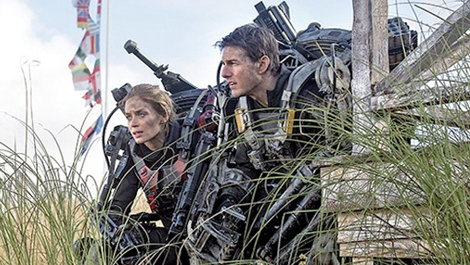
Cruise is currently working harder than ever. Out in cinemas in December is Jack Reacher , a tiptop adaptation of Lee Child’s bestseller One Shot, while intergalactic actioners Oblivion and Edge Of Tomorrow are, respectively, in the can and shooting.
Then there’s horror-comedy Van Helsing , the fifth Mission: Impossible announced, and the belated – but much- anticipated – Top Gun sequel also in the mix.
Cruise is happy to talk about them. “ Oblivion and Edge Of Tomorrow are totally different,” he says, pointing out that playing an ET-fighting soldier in both is a superficial detail.
“ Oblivion is an action-thriller, in which I fly this... bubble- ship, and the world is already post-apocalyptic; Edge Of Tomorrow is a war movie, in which I wear a 100lb exo-suit that has grenade launchers and machineguns. But it’s not just a war movie. Doug Liman takes a genre and turns it inside out...
“ Van Helsing ,” he continues, “we’re figuring out. Do we make a horror comedy, character comedy? What time period?” Suddenly he grows excited, his voice climbing another decibel.
“When I think of American Werewolf In London ... Do you remember the first time you saw that movie? Wasn’t it just amazing? And we haven’t had one of those for... Look, I’m not saying that Van Helsing will be that, tonally, but... I’ll never forget seeing American Werewolf on a Friday night. It was a seven o’clock showing in Westwood, and it was like, ‘C’mon, this movie’s incredible!’”
And how about Mission: Impossible V ? He must be confident after Ghost Protocol smashed it... “Can you believe that?” he cuts in. “I mean, c’mon! It was wild. Seeing an audience respond... to have that experience is really wonderful.
I started Mission: Impossible hoping I could make many of them. It’s a character that I can grow with. At that time it was the most expensive film in the history of Paramount Pictures, and the first film I was producing. It’s been pretty exciting. I’ll make a bunch of those. I’ll make as many as people want to see... because they’re very challenging, and so much fun to make.”
Any ideas for the plot and set-pieces? “We’re already working on different images. Talking conceptually. I love travelling around promoting different movies because I’m always looking at different places, and I always walk around to see the city. I look at architecture, subways... coming up with different sequences.”
Top Gun 2 is a tougher one to discuss. “That was horrible,” he says of Tony Scott’s death on 19 August. “I love Tony. I mean, what a filmmaker. We were so excited about Top Gun 2 . Now we’re just taking a pause, to be honest. It’s something... we’ll see, we’ll see about that...”
Cruise needs to prepare for day two of Edge Of Tomorrow but seems happy to talk all evening. It is Total Film, not he, who insists we call an end to the interview, but not before we pick highlights from the last 15 years of his career – starting with his own favourite film or performance.
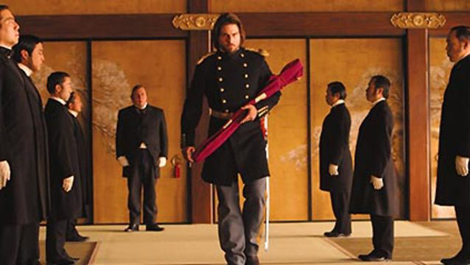
“That’s like ‘what’s your favourite child!’” he groans. “I can’t say which one. I don’t know...” Come on, if future generations were allowed access to just one movie, the one that most encapsulates Tom Cruise... “I don’t know!
"I remember The Last Samurai . It took a year of preparation... But then I look at Les Grossman or the last Mission ...
"There’s different things where I know what we all accomplished together. Making a movie is not just me. What I love about films is that hundreds of people come together.
"We’re all depending on each other, and you have a 12 to 16 hour day, and you don’t get that day back. In the movie business, you have to look at every problem as an opportunity. The ones who stay in the business and enjoy it are able to appreciate the excitement of that.”
He won’t be drawn on a favourite director either – perhaps not a surprise considering he’s worked with Francis Ford Coppola, Ridley Scott, Tony Scott, Oliver Stone, Martin Scorsese, Rob Reiner, Sydney Pollack, Neil Jordan, Brian De Palma, Cameron Crowe, Stanley Kubrick, Paul Thomas Anderson, John Woo, Steven Spielberg, Ed Zwick, Michael Mann, J.J. Abrams, Robert Redford, Bryan Singer...
“Each one brings a different experience,” he explains. “To see each director with a different piece of material, how they deal with that material, their choices and tone... When I finally worked with Steven, on Minority Report , I’d known him almost 20 years. We were looking at each other on set and going, ‘We’re finally doing this, it’s happening.’ Then also to give young filmmakers, like J.J., the opportunity – that stuff is exciting. To work with Brad Bird...”
So who hasn’t he worked with yet that he’d like to? Malick, Cronenberg, Cameron? “There’s a lot of them. I’d love to work with all of the names you’ve said, and younger filmmakers coming up.”
Whoever Cruise teams up with in the next 15 years, you can be sure of one thing: he’ll put in unstinting shift after unstinting shift.
“When I work with someone, I give it 100 per cent,” he agrees, offering a final booming laugh. “I give it 110!”
Jamie Graham is the Editor-at-Large of Total Film magazine. You'll likely find them around these parts reviewing the biggest films on the planet and speaking to some of the biggest stars in the business – that's just what Jamie does. Jamie has also written for outlets like SFX and the Sunday Times Culture, and appeared on podcasts exploring the wondrous worlds of occult and horror.


